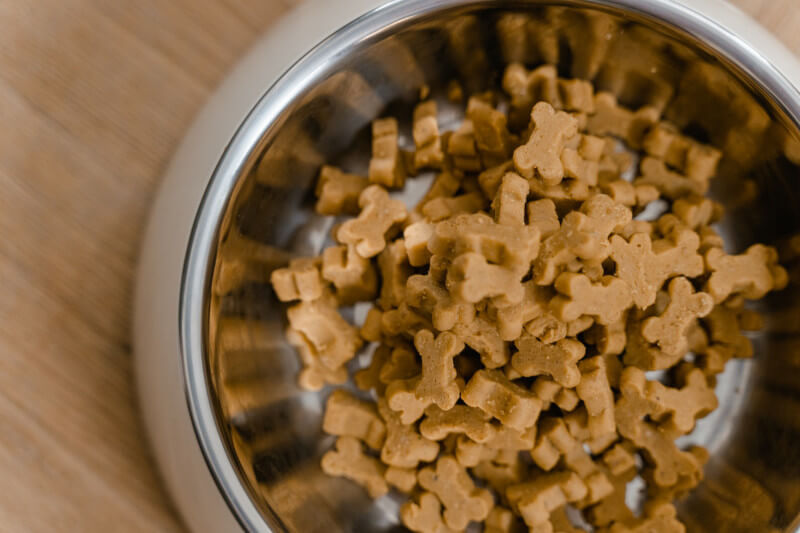Size, breed, age, and each dog’s health profile all play a role in dictating its specific dietary requirements. This implies that there is no universal rule to follow when selecting dog food. Here, we delve deeper into why it’s so crucial to provide your dog with food suitable for its age and what else you should keep in mind.
There is a wide variety of options for dog food that is appropriate for each stage of life. But how can you know what period is ideal for your dog? Learning about the different dog food options for different ages and life stages can help you provide the greatest nutrition for your dog.
Understanding the changes occurring in our dogs’ bodies at various ages is crucial when deciding what to feed them. Picking the correct puppy food for your pup’s size is the first step toward a healthy life. Your dog should be switched to adult dog food once it has done growing, and its weight and overall health should be monitored as usual. Knowing how to give yourself a body condition score can help you with this. When your dog reaches senior status, you and your veterinarian may want to reconsider their diet.
Dog Food
To establish a baseline for future health, it is important to take your new puppy to the vet before you bring her home. Now is the time to ask your vet for advice on what kind of puppy food is most suited to your dog’s breed, size, and health. We cannot stress enough the necessity of providing your puppy with a high-quality dietary regimen early on that will serve as a solid foundation for her future health.
Puppies require special diets that can support their rapid growth over the first year and a half of their lives. Puppies have a substantially higher caloric requirement than adult and senior dogs because of their rapid development. Health issues in the future are possible if they don’t eat enough animal proteins, high-quality fats, and the important nutrients to support their early growth.
Puppies of all sizes can get the nutrition they need from the Hill’s Science Plan line, with options for small and mini breeds (formulated for optimal brain and eye development), medium breeds (formulated for robust immune and digestive health), and big breeds (formulated for optimal skeletal and joint development). Hill’s Science Plan puppy food addresses the specific health concerns of large and giant breed puppies with formulations tailored to their dietary needs.
A Healthy Diet for Adult Dogs

Developmentally, a dog is considered an adult between the ages of 12 and 18 months. It’s crucial to tailor your puppy’s diet to her specific health conditions and activity levels. At this point, her growth spurt will have levelled off, so her diet should focus on helping her maintain a healthy weight. If she develops symptoms of a chronic condition, such as arthritis or degenerative joint disease, kidney troubles, skin allergies, or anything else, the right diet will help her body better respond to treatment.
Hill’s Science Plan adult dog food for small and mini breeds is scientifically formulated to meet the unique nutritional needs of these dogs throughout their whole lives. This meal helps maintain optimal immune function, dental hygiene, skin and coat quality, and overall digestive health. Their medium-breed adult dog food promotes a healthy digestive system, strong muscles, and a shiny coat. High-quality nourishment for large dogs is included in Hill’s Science Plan adult dog food for large breeds. This food is formulated to promote healthy joints and muscles. The Hill’s Science Plan adult range includes options for dogs with special nutritional needs, such as those with:
- Skin and stomach sensitivity in the context of weight management
- Performance and working dogs on a grain-free diet that emphasises dental hygiene
- Explore the many options, both dry and wet, and consult your vet for the best choice based on your pet’s specific dietary requirements.
Allow them To Age With Dignity
Your dog will need to go from the adult to the mature adult dog food line when she enters her senior year. Because larger breeds tend to have a shorter life expectancy, this is dependent on their breed size and weight. Your dog’s kidneys will require less mineral content in her meal as she ages, and senior dog foods account for this. It’s vital to have your vet’s advice on your dog’s feeding routine, especially as they get older because Hill’s Science Plan for mature adult dogs is based on the breed size and age. Here are a few of their meal plans and what they can help with:
- Mature adult dog food for small and mini breeds.
- Promotes immunity for a long and healthy life.
- Has a mineral formula that is carefully monitored for optimum organ health.
- Aids with dental hygiene and physical mobility.
- Medium-sized adult dog food, formulated to promote healthy joints, mobility, and critical organs.
- Large-breed adult dog food that’s good for their joints, mobility, their lean muscle mass, and their organs.
Advice on How to Feed Your Pet

Here are some options for separate pet feedings:
- Instead of free feeding, in which the entire day’s food is provided at once, feed smaller portions twice or thrice daily.
- At feeding time, give your pets 15 to 20 minutes to eat their food before separating them.
- Feed cats at various heights if one is young and nimble while the other is overweight and unable to climb high. This will allow the younger cat to eat from a higher perch while the older, less mobile cat eats on the floor.
- If you don’t have access to separate rooms for your dog and cat, put their bowls in opposite corners of the room and keep a tight eye on them as they eat.
- If you want your dog or cat to live a long and healthy life, it’s important to provide it with a balanced diet that takes into account its age, size, and any health concerns it may have.
As you can see, it’s important to feed your dog a diet tailored to its breed and individual health needs, both for preventative purposes and to help it age gracefully. These selections will guarantee that your dog receives a healthy diet for the duration of her life, allowing for more adventures and fewer trips to the vet due to preventable health issues.

